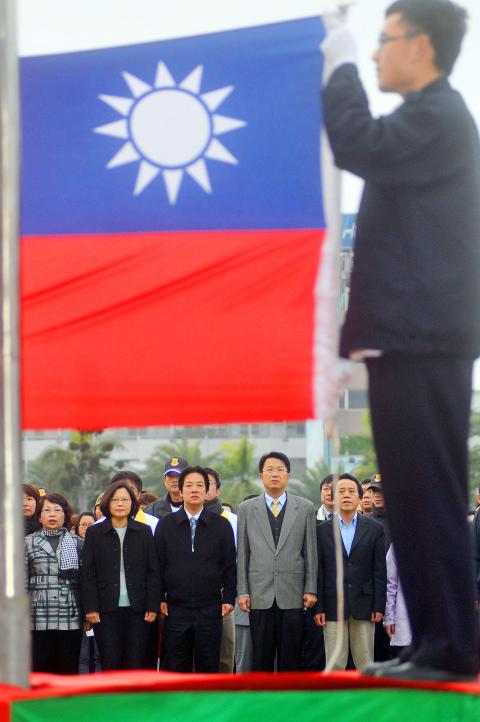In her New Year speech yesterday, Democratic Progressive Party (DPP) presidential candidate Tsai Ing-wen (蔡英文) said her wish was to win the Jan. 14 presidential election and promised to turn Taiwan into a country where solidarity and justice prevail.
“My fellow countrymen, I wish you a happy new year on the first day of 2012. I would also like to take this opportunity to offer my sincere pledge to make Taiwan a country of solidarity and justice,” she said at a flag-raising ceremony in Greater Tainan.
A collective upward dynamic and cohesiveness are desperately needed in Taiwan as people have lost their hope for the future and their trust in any political promise in the past three-and-a-half years, during which the government has malfunctioned, she said.

Photo: CNA
That is why she is determined to win the presidential election so her administration would be able to strive to regain “a sense of direction, the strength to march forward and people’s trust in politics,” Tsai said.
“That is the responsibility of our generation. And every one of you will be able to play a crucial part in the change for the better,” Tsai said.
With the presidential race moving into the final two weeks before the election, Tsai has been trying to consolidate support for her candidacy with extensive visits to various parts of the nation.
Meanwhile, at a press conference yesterday, former premier Su Tseng-chang (蘇貞昌), who serves as Tsai’s campaign chairman and ran as vice presidential candidate in the DPP’s failed bid in the 2008 presidential election, submitted the “three urges of respect.”
These are a call on Beijing to respect Taiwan, on the government to respect the people and on voters to respect their own free will.
The presidential election is the highest form of demonstrating the people’s collective will, Su said in Taipei, and China should refrain from any interference in the democratic process or threaten use of force against Taiwan.
In the lead-up to the election, Beijing officials have issued a number of official comments that made no secret of their support for President Ma Ying-jeou’s (馬英九) re-election bid and have threatened that the stability of cross-strait relations could be undermined if the DPP were to re-enter the Presidential Office.
The government should respect its people by maintaining administrative neutrality and preventing the use of vote-buying, Su said.
Su also urged voters to respect their right to vote and say “no” to vote-buying to enable Taiwan’s democracy to deepen.

‘WIN-WIN’: The Philippines, and central and eastern European countries are important potential drone cooperation partners, Minister of Foreign Affairs Lin Chia-lung said Minister of Foreign Affairs Lin Chia-lung (林佳龍) in an interview published yesterday confirmed that there are joint ventures between Taiwan and Poland in the drone industry. Lin made the remark in an exclusive interview with the Chinese-language Liberty Times (the Taipei Times’ sister paper). The government-backed Taiwan Excellence Drone International Business Opportunities Alliance and the Polish Chamber of Unmanned Systems on Wednesday last week signed a memorandum of understanding in Poland to develop a “non-China” supply chain for drones and work together on key technologies. Asked if Taiwan prioritized Poland among central and eastern European countries in drone collaboration, Lin

The Chien Feng IV (勁蜂, Mighty Hornet) loitering munition is on track to enter flight tests next month in connection with potential adoption by Taiwanese and US armed forces, a government source said yesterday. The kamikaze drone, which boasts a range of 1,000km, debuted at the Taipei Aerospace and Defense Technology Exhibition in September, the official said on condition of anonymity. The Chungshan Institute of Science and Technology and US-based Kratos Defense jointly developed the platform by leveraging the engine and airframe of the latter’s MQM-178 Firejet target drone, they said. The uncrewed aerial vehicle is designed to utilize an artificial intelligence computer

Renewed border fighting between Thailand and Cambodia showed no signs of abating yesterday, leaving hundreds of thousands of displaced people in both countries living in strained conditions as more flooded into temporary shelters. Reporters on the Thai side of the border heard sounds of outgoing, indirect fire yesterday. About 400,000 people have been evacuated from affected areas in Thailand and about 700 schools closed while fighting was ongoing in four border provinces, said Thai Rear Admiral Surasant Kongsiri, a spokesman for the military. Cambodia evacuated more than 127,000 villagers and closed hundreds of schools, the Thai Ministry of Defense said. Thailand’s military announced that

CABINET APPROVAL: People seeking assisted reproduction must be assessed to determine whether they would be adequate parents, the planned changes say Proposed amendments to the Assisted Reproduction Act (人工生殖法) advanced yesterday by the Executive Yuan would grant married lesbian couples and single women access to legal assisted reproductive services. The proposed revisions are “based on the fundamental principle of respecting women’s reproductive autonomy,” Cabinet spokesperson Michelle Lee (李慧芝) quoted Vice Premier Cheng Li-chiun (鄭麗君), who presided over a Cabinet meeting earlier yesterday, as saying at the briefing. The draft amendment would be submitted to the legislature for review. The Ministry of Health and Welfare, which proposed the amendments, said that experts on children’s rights, gender equality, law and medicine attended cross-disciplinary meetings, adding that